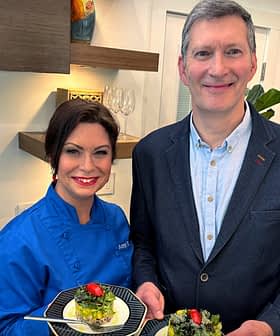Tom Mueller's New Book Delves Into the World of Whistleblowers
As whistleblowers dominate headlines in the United States, Crisis of Conscience: Whistleblowing in an Age of Fraud shines a light on the history of whistleblowing and people who do it.
 Photo by Dave Yoder
Photo by Dave YoderTom Mueller, author of the New York Times bestseller Extra Virginity: The Sublime and Scandalous World of Olive Oil, is back with a new investigative book delving into the world of whistleblowers: Crisis of Conscience: Whistleblowing in an Age of Fraud.
“I started with a fascinating but small area of whistleblowing, the False Claims Act or ‘Lincoln Law,’ signed into law by Abraham Lincoln at the height of the Civil War to fight contractor fraud,” Mueller told Olive Oil Times.
It’s only when the other watchdogs… are muzzled or euthanized that whistleblowers, left as the last line of defense, are compelled to act.
“Gradually my ambit of whistleblowing grew, as I realized that the human dynamics of a toxic organization and one person who turns against it – both the personalities of the whistleblowers and the nature of the retaliation they suffer – was universal,” he added.
As Mueller delved deeper into the psychology, history and evolutionary biology of whistleblowing, the scope of the book burgeoned. Over the course of seven years, he interviewed more than 200 whistleblowers and 1,000 other experts, including attorneys, prosecutors and social scientists.
“I also spent a lot of time with many of my whistleblowers, getting to know their histories and their character,” he said. “This makes the stories more authentic and compelling.”
Mueller has worked with whistleblowers before. A few of them helped him get the inside story on the fraud in the olive oil industry for Extra Virginity.
“In part, the common thread between olive oil and whistleblowing is the underlying fraud, which threatens both great oil and courageous whistleblowers,” he said.
In spite of the fundamental differences between Crisis of Conscience and Extra Virginity, Mueller said that there were some surprising similarities. Both books began as limited projects before expanding into in-depth exposes.
Both books also focussed on individual stories, which helped to turn abstract ideas into compelling narratives.
“As with my olive oil book, Crisis of Conscience: Whistleblowing in an Age of Fraud is very definitely centered on human stories,” he said. “I interweave the history, psychology [and] evolutionary biology of whistleblowing within gripping narratives of real-life whistleblowers in dramatic, sometimes life-threatening situations.”
The book, which went on sale last week, could not have come at a more timely moment.
Two complaints against President Donald Trump have brought whistleblowers to the front of the news. While many observers have called these complaints unprecedented, Mueller disagrees, citing numerous examples in his book of previous national security insiders blowing the whistle and dealing with the consequences.
Mueller added that the whistleblowing events that are currently unfolding demonstrate how broken the system is for protecting whistleblowers. While working on Extra Virginity, Mueller noticed that the system was similarly flawed, which may explain why the story of rampant fraud throughout the olive oil sector took so long to come to the surface.
“Italian law didn’t offer the kinds of protections to whistleblowers back then that they need to come forward – but the recently-passed Whistleblower Protection Directive now gives the E.U. stronger whistleblower laws than the U.S.,” he said.
More so than being a book about courageous people who do the right thing, Crisis of Conscience shows how so many modern business and political institutions have been designed to protect fraud and make inconvenient truths harder to uncover.
“We should not need whistleblowers,” Mueller said. “As so many of them have told me, ‘I hate the word ‘whistleblower’! I was just doing my job!’ It’s only when the other watchdogs – investigators, investigative journalists, government regulators and others – are muzzled or euthanized that whistleblowers, left as the last line of defense, are compelled to act.”








